“Men go abroad to wonder at the heights of mountains, at the huge waves of the sea, at the long courses of the rivers, at the vast compass of the ocean, at the circular motions of the stars, and they pass by themselves without wondering.” -Saint Augustine
Well, another week has gone by -- the second of the year -- here at Starts With A Bang! Hopefully, none of you noticed a drop in the quality or frequency of the science I've been bringing you, because I've had the flu, but I've been working hard to make sure you get all the science you've come to expect. And it's been a tremendous week, with reports from the American Astronomical Society, future missions and a look back on some of the Universe's greatest mysteries and wonders. If you missed anything, here's what we've covered:
- Could the Universe have begun from a Big Bounce? (for Ask Ethan),
- Earliest, brightest galaxies shine a ghostly green in surprising new find (for Mostly Mute Monday),
- The James Webb Space Telescope will truly do what Hubble only dreamed of,
- The two questions that determine your scientific literacy,
- We still don't know how fast the Universe is expanding, and
- How the Hubble Space Telescope changed the Universe.
The best stories and profiles are still coming, of course, but there's no point in delaying any further. You've had plenty to say -- to me and one another -- so let's jump into our comments of the week!
Daniel Van Noord '14 and Larry Molnar predict explosion that will change the night sky. Image credit: Calvin College.
From Wow on an impending stellar merger in our galaxy: "BOOM!
Why do my stars go BOOM!
https://science.slashdot.org/story/17/01/10/1255251/scientists-predict-star-collision-visible-to-the-naked-eye-in-2022"
There is a lot to say about so many stories from AAS that I have so many in the queue and so many more still to highlight. This one went viral while I was writing about other things, so I likely missed out. But it's worth pointing out that if the predictions are correct -- and there are good reasons to think they are -- there is a luminous red nova in our future. We've seen relatively recently in our own galaxy, albeit its views through Hubble are the most famous and spectacular: the star v838 Monocerotis.
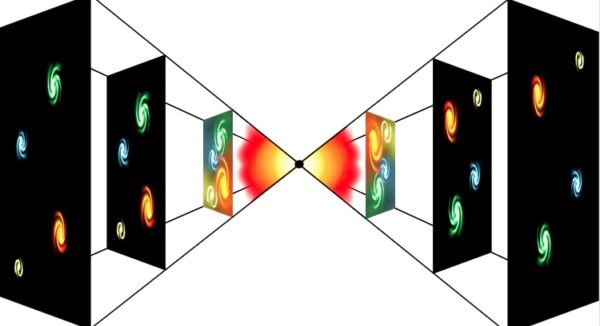 A 'Big Bounce' requires a recollapsing phase followed by an expanding phase. Image credit: E. Siegel, derivative from Ævar Arnfjörð Bjarmason under cc-by-2.0.
A 'Big Bounce' requires a recollapsing phase followed by an expanding phase. Image credit: E. Siegel, derivative from Ævar Arnfjörð Bjarmason under cc-by-2.0.
From Ed on the entropy question: "Unfortunately I am not well versed in physics so I have a very basic question to help me understand this concept. When you reference entropy, you use the equation 10^104k. I get that this is a very big number, but my question is, number of what? What is the unit of measure for entropy?"
What is entropy? It's in units of Energy per Temperature. So, for example, Joules per Kelvin would be the standard mks units. Why did I give it in terms of k, Boltzmann's constant? Because k is a constant in units of energy per temperature, and so we give entropy as either a number in terms of J/K, or we give it as a number multiplied by k, which allows you to choose your own units. It's a good question, but an even more convenient definition!
In classical general relativity, singularities are hard to avoid. But in quantum theories of gravity, such as those with extra dimensions, bouncing scenarios are possible. Image credit: Wikimedia Commons user Rogilbert.
From Omega Centauri on hitting the entropic reset button: "How solid is the theory that entropy must always increase, especially when the universe crosses a [near-singular] or singular point? Is it possible that these events reset entropy?"
At a singularity itself, everything becomes nonsense. Nobody likes to hear that, because time and space themselves become singular, so how can you define any other quantity when the most fundamental entities in the Universe don't exist? If you want to continue your definitions of things in a sensible way, you need to either avoid singularities, or you need to go beyond General Relativity. If you do either of those things, however, the theory that entropy must always increase is incredibly solid.
But technically, there is nothing we can say about entropy in a well-defined way when energies and temperatures themselves go to infinity, which they do at a singularity. So a near-singular state can't reset anything, but a true singularity might do anything it likes, and we can't do anything to prove otherwise. In other word, "thar be dragons," and be careful.
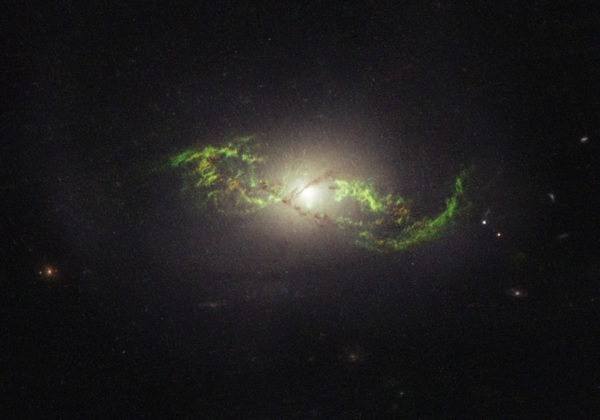 Some rare galaxies exhibit a green glow thanks to the presence of doubly ionized oxygen. This requires UV light from stellar temperatures of 50,000 K and above. Image credit: NASA, ESA, and W. Keel (University of Alabama, Tuscaloosa), of NGC 5972.
Some rare galaxies exhibit a green glow thanks to the presence of doubly ionized oxygen. This requires UV light from stellar temperatures of 50,000 K and above. Image credit: NASA, ESA, and W. Keel (University of Alabama, Tuscaloosa), of NGC 5972.
From Sinisa Lazarek on early, oxygen-rich galaxies: "Question. How can the earliest galaxies be oxygen rich? If BB created mostly H and He and tiny amount of rest, wouldn’t you need at least several generation of stars going nova and releasing oxygen before oxygen rich galaxies could form?"
When we say "earliest," we need to be extremely careful with what we mean. The very, very first stars that form in the Universe are made 99.9999999% out of hydrogen and helium, with literally no heavy elements (carbon or higher) in them. But those very first stars ought to be:
- disproportionately high in mass,
- they ought to burn hotter and be more luminous,
- they ought to live for very short amounts of time,
- and -- most importantly -- when they go supernova after just a few million years, they should "enrich" (i.e., pollute) their regions of space with heavy elements.
That means the second generation of stars should contain these heavy elements, and after hydrogen and helium, the third most abundant element in the Universe is oxygen.
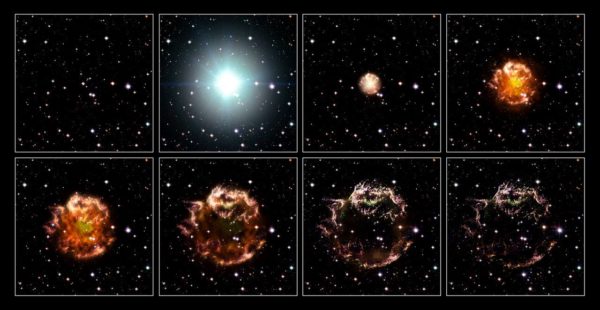 An animation sequence of the 17th century supernova in the constellation of Cassiopeia. Image credit: NASA, ESA, and the Hubble Heritage STScI/AURA)-ESA/Hubble Collaboration. Acknowledgement: Robert A. Fesen (Dartmouth College, USA) and James Long (ESA/Hubble).
An animation sequence of the 17th century supernova in the constellation of Cassiopeia. Image credit: NASA, ESA, and the Hubble Heritage STScI/AURA)-ESA/Hubble Collaboration. Acknowledgement: Robert A. Fesen (Dartmouth College, USA) and James Long (ESA/Hubble).
The thing is, these pristine pockets of gas -- where no stars have form -- start to disappear very, very quickly. By time the Universe is reionized at z ~ 6, when it's around 600 million years old, 99% of the Universe has approximately 0.1% (or more) of the heavy elements the Sun has today, which is more than enough to create this oxygen line. The question isn't whether, on average, most of these galaxies will have this oxygen feature; they will. It's whether, once JWST comes online, it can find the oxygen-free rarities that are out there, and help us better understand how we transition from a metal-free to a metal-rich Universe.
In the meantime, the mystery of why these stars at early times burn so much hotter than even the metal-poor stars of today do will still puzzle scientists for a time.
From Paul Dekous on an image worth sharing: "I thought that this cool overview of the periodic table and its origin was slightly relevant:
https://pbs.twimg.com/media/C1mhrzvXAAEwh3N.jpg:large
Not sure if Ethan has ever used it already is some post."
I saw this image in this form for the first time at AAS this past week, so although I've used variants, I've never used this particular one before.
Two neutron stars colliding, which is the primary source of many of the heaviest periodic table elements in the Universe. Image credit: Dana Berry, SkyWorks Digital, Inc.
From eric on how high supernovae can take us: "Though it somewhat arbitrarily cuts off at 92, when the most likely explanation for why we don’t see higher-z elements in nature is because of [their] half-life, not because they weren’t produced."
The r-process is quite rapid, but that's not how the majority of the heaviest elements are produced; rather, they're produced by neutron star-neutron star collisions. About 0.1 solar masses worth of material -- mostly neutron-based ejecta -- are expelled during a neutron star-neutron star collision, meaning that the heavier elements are disproportionately produced there. How high do they go? We're unsure, but there is evidence that Earth has primordial Plutonium, and were it younger, we'd probably see primordial Curium as well. It would be unsurprising if our planet didn't begin with isotopes of elements 98 and 100 as well; beyond that, decay would probably be too fast.
From Hank Roberts on the hope of the greenest galaxy: "Shucks. I was hoping that green was due to chlorophyll"
Although this is tongue-in-cheek, there's some interesting science here. Chlorophyll is green because it reflects green light; this doubly-ionized oxygen emits green light, which is what happens when electrons transition downward in energy in their orbitals. We could only ever see chlorophyll at a distance from its absorption line properties; astronomically detecting it via its green color would be an impossibility with the technology and techniques we currently have and use.
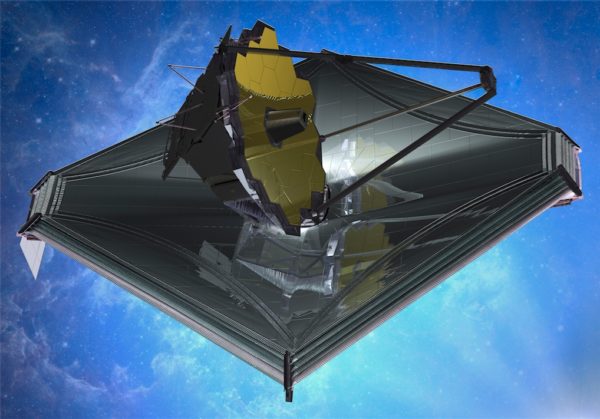 August 2013 James Webb Space Telescope mural image. (Artist's impression.) Image credit: Northrop Grumman.
August 2013 James Webb Space Telescope mural image. (Artist's impression.) Image credit: Northrop Grumman.
From MandoZink on James Webb and the future: "Aaaarrrgghhh! What a time to be reading this topic. I have spent the last decade waiting with excitement for this launch, witnessing the “first light” image, and then seeing all the wondrous images that follow..
Sadly, I am currently sitting in the James Brown Cancer Center in Louisville getting my third treatment of chemotherapy. and I just realized I will never see the results of this endeavor. It never occurred to me that this might happen.
sniffle, sniffle…
All-in-all it’s been a great universe.
( Ron Seadler aka MandoZink )"
Ron, it has been a pleasure to have you join us here, and while I hope you can join us for long enough to see JWST's successful launch (October of next year), its first science (March of 2019), and well beyond, I recognize that all of us have finite lives and a finite amount of time on this planet. I hope you continue to join us for as long as you can, and I hope the chemo is successful at killing the cancer and your body remains resilient and strong. All the best to you.
From Denier on the hope of pandering to the new PEOTUS: "“Finally Mr. President, we have decided to scrub the name of some bureaucrat off the project and rename it the Trump Space Telescope. We’ve included the addition of a gold foil ‘T’, ‘R’, ‘U’,. ‘M’, and ‘P’ in the solar shielding. Of course we’ve made an allowance in the budget to pay the Trump Corporation for name usage rights even though we know you (wink-wink) have severed all ties with those business interests."
This is a great idea, but you've got to keep that away from the solar shielding. You can't put it on the mirrors, since they need to be accurate to 20-22 nanometers, and you can't put it on the sunshield, since gold is too conductive to face the Sun. I'm hopeful that we can get some next-generation funding for a telescope yuuuuger than anything else we've ever put into space in the 2030s, though. Something like a:
- Telescope
- Reflecting at
- Unbelievably
- Megalonormous
- Proportions.
Stay optimistic, kids.
From Chris Mannering on 'Darth Vador' in the JWST: "In that first picture Ethan puts up, of the deep field, you can clearly see the outline of Darth Vador’s helmet. I don’t have a problem with that but why is he looking at us?"
He was probably mad about the whole catering thing, and getting confused with Jeff.
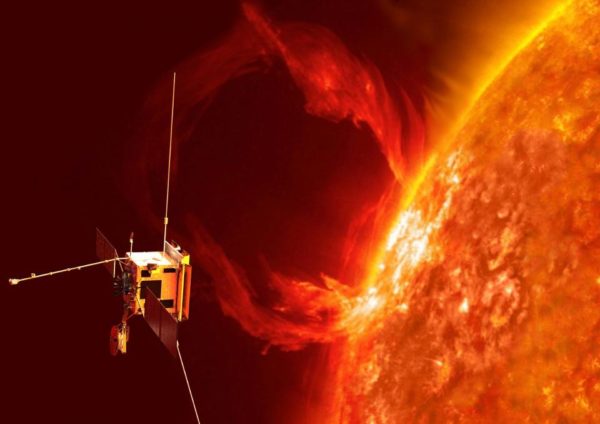 Solar orbiters are great ways for studying the Sun, and are part of how we've learned so much about our Solar System's greatest natural energy source. Image credit: ESA, via http://www.esa.int/Our_Activities/Space_Science/Solar_Orbiter.
Solar orbiters are great ways for studying the Sun, and are part of how we've learned so much about our Solar System's greatest natural energy source. Image credit: ESA, via http://www.esa.int/Our_Activities/Space_Science/Solar_Orbiter.
From eric on differing definitions of science literacy: "In terms of trying to come up with simple questions to test science literacy, I’d take a clue from Binet. Identify the stuff you think people ought to know, then test a bunch of simple questions related to it until you find some good proxies. The questions themselves don’t necessarily have to be fully representative of the entire subject matter and don’t have to attempt some broad comprehension (like “the scientific enterprise”). As long as you can show that performance in answering the simple questions is strongly correlated with the understanding you’re trying to measure, you’re good – you’ve got a useful test of science literacy."
This is pretty much what every "scientific literacy scholar" says. Wait, I should back up. This is pretty much what everyone who believes that "testing to identify some trait" is a good proxy for measuring "whether someone is good at that trait", and that such measurements are useful. You bring up Binet, who's the founder of the first recognized IQ test. But I think that entire methodology has a huge flaw: even the most scientifically literate people, by that definition, will suck at drawing valid scientific conclusions under most circumstances. That is, they will be lousy at it when it comes to fields that they aren't experts in.
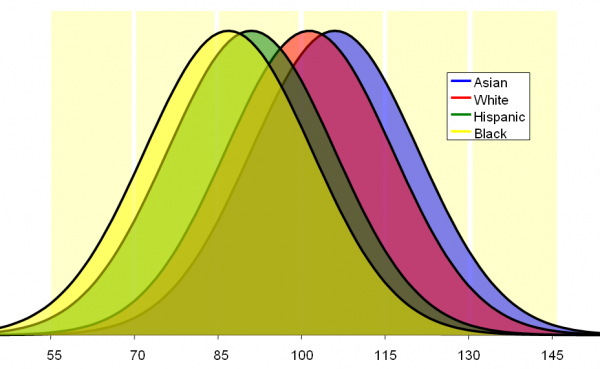 Arguments and conclusions drawn from test results don't necessarily reveal the truths you think they will. Image credit: Wikimedia commons user Quizkajer.
Arguments and conclusions drawn from test results don't necessarily reveal the truths you think they will. Image credit: Wikimedia commons user Quizkajer.
Rather, I propose throwing the "I can do it myself" model out the window, where it belongs, and replace it with, "I have respect for those who are experts in things I myself am not an expert in." I'm not an expert in auto mechanics, which is why I take my car to an auto mechanic when I'm out of my depths, which is usually. (Although I did replace both front headlight units this year, woo hoo!) I'm not an expert in medicine, so when I have a medical issue -- sure, I'll do my homework as best as I can ahead of time -- I go to the doctor. And when I have a question about climate science, fluoridated drinking water, or any other field, I go to the experts in those fields. That is what awareness (and the associated respect) and appreciation is all about. The scholar Morris Shamos was the biggest advocate of this approach, and IMO, he was right in a way that Binet can never be.
The Apollo 1 prime crewmembers for the first manned Apollo Mission (204) prepare to enter their spacecraft inside the altitude chamber at the Kennedy Space Center (KSC). The Apollo program brought huge advances in technology to the entire world, independent of anything else we learned about space. Image credit: NASA.
From Sinisa Lazarek on the tremendous respect issue: "I am not dismissing anyone. Quite the contrary, my main objection to OP is the request for “tremendous respect” for anyone with a job in science as opposed to what I assume would be the rest. Why?"
Because what you are hearing is, "respect scientists in a way you don't respect other people," and what I'm trying to communicate is, "respect scientists in a way that many people do not, right now." Many people, when they think of scientists, they think about a group of people telling them something that they don't want to accept; telling them something that they know in their hearts must be a lie; telling them something that cannot possibly be true.
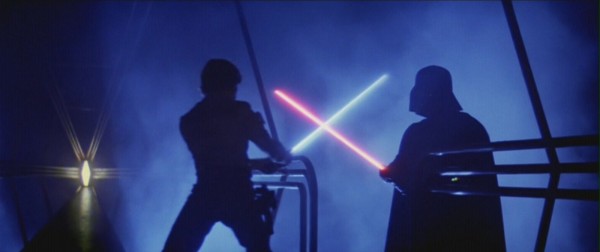 A certain scene shortly before the famous "that's not true; that's impossible!" scene. Image credit: Lucasfilm / The Empire Strikes Back.
A certain scene shortly before the famous "that's not true; that's impossible!" scene. Image credit: Lucasfilm / The Empire Strikes Back.
But you cannot simply go out and find cherry-picked facts to make the conclusion untrue. That's what I want to safeguard against. That is what is happening; it's what has been happening for a long time, and that cannot be countered so long as people don't respect science and what scientists do, as well as the self-correcting scientific enterprise itself. And that is why "learning facts" and "figuring it out for yourself" isn't going to cut it.
Image credit: VLT’s Survey Telescope, ESO/INAF-VST/OmegaCAM. Acknowledgement: OmegaCen/Astro-WISE/Kapteyn Institute.
And finally, from Denier on cutting right to the chase: "When you get right down to it, this is just more elitism."
Yes. Yes, you said it, and this is right. Elite, expert knowledge -- someone armed with expert facts, expert skills, expert reasoning and the ability to draw expert conclusions -- is worth more than the opinion of a non-elite person. There is no greater example of this than in science. Last week, just last week, you were telling me that your elite knowledge of the law was worth more than my non-elite knowledge, and I agreed that you were right, immediately. So here's the Carl Sagan challenge for you:
In science it often happens that scientists say, 'You know that's a really good argument; my position is mistaken,' and then they would actually change their minds and you never hear that old view from them again. They really do it. It doesn't happen as often as it should, because scientists are human and change is sometimes painful. But it happens every day. I cannot recall the last time something like that happened in politics...
This happens in science. It's happening right now as respects Tabby's star. Will you, without that expertise, follow the arguments and teachings of experts and adhere to what they conclude? Can you do it? Will I see you do it here? And will I see you do it as respects all aspects of robust, well-understood science even if it's not well-understood by you? Good luck, and we'll come back next week for the answer!

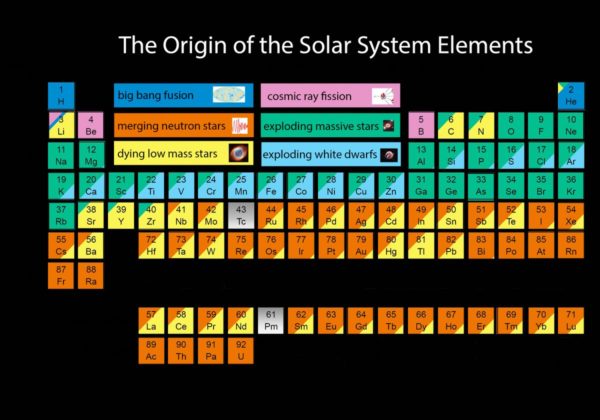

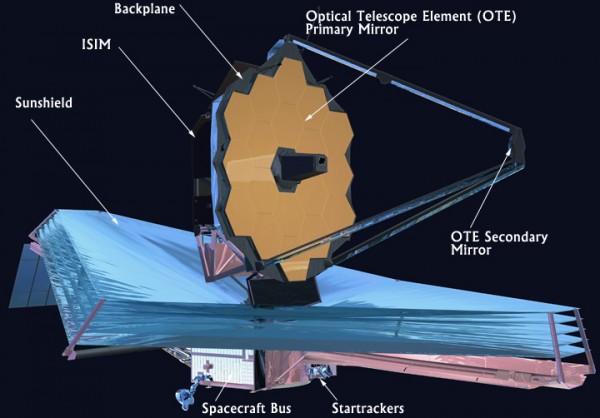

@Ethan wrote
Of course that is right, and I understand why you would trust in the work of auto mechanics and medical doctors. I have no issue with persons placing difffering information reliability values on both facts and opinions based upon the education, experience, and personal history of the source. No problem there. Totally get it and am on board.
The problem I have is that is not 'literacy'. You don't gauge how well a kid can read by testing for how well they like their teacher. To test literacy you determine how well a kid can read and write.
When you strip out competence or knowledge from making your determination on who is or is not science literate, you're redefining the word. I will grant that literacy can not necessarily be confined to memorized facts. Knowledge on where to get the needed knowledge, be it old college text books, published scientific literature, or even authoritative people, is just as valuable. Still science literacy has to be about competence or knowledge.
Lastly, I would argue that you @Ethan are *NOT* science literate by your own measure. In your response to @eric above, you admit the idea I'm trying to convey 'is pretty much what every “scientific literacy scholar” says'. You are failing to have tremendous respect for the work of all of these experts in the field you are discussing. That is not very fan-boy of you. I think you just got thrown out of your own club.
"Of course that is right, and I understand why you would trust in the work of auto mechanics and medical doctors. "
However, When you get right down to it, this is just more elitism., isn't it. Which, from the tone and content of the rest of the post you think is a bad thing to be avoided.
People will go to the doctor for medical advice AND TAKE IT. If there seems some controversy or some shocing results, you go take a few other opinions on the issue. And you take the consensus one. Even though this is talking about your life.
Do you go do the same thing with climate science?
No.
And in a more general sense, people will ask doctors (or solicitors, or mechanics) for advice on what their expertise is. How many people would ask a scientist anything?
Not many.
Indeed this website is regularly victim of a drive-by-trolling brainfart that science has it all wrong,the point being to come here not to ASK about this new radical idea (especially not to listen), but to proclaim it for everyone to wonder at.
You get very few people faking a medical procedure or diagnosis,and even fewer claiming a breakthrough motor mechanic claim when the proponent has clearly no idea what they're on about apart from maybe having read it in Private Eye or some such.
That's not the respect doctors or mechanics (or plumbers) get, is it.
Tabby’s star.? Forgive me Lord,as I can't comprehend how these heathens rationalize material B.S...
In cyclic cosmology, when the Universe's wave-equation's phase transits 2PI to zero, entropy is zeroed. Magic happens here. *Everything* is reset to zero. That's what the Wheeler-DeWitt equation is on about. :-)
Richard, the problem with it though is the huge beg: that all entropic states are the same at maximum. Otherwise there's no phase transit to zero, no seamless join to the next cycle.
A random signal multiplied by a sine wave isn't going to repeat after the first half wave. There's no reset. Just a continuation of the random noise.
But if entropy goes ever upward, then each universe must be less energetic than the one before, and that means even if we cycle, it's the same one as a bouncing ball goes through with all the damping of oscillation that entails, and our universe would still be finite. So it would be adding an unnecessary step to posit a cycling universe, since we'd still have to explain the first starting up.
Or we'd still have to ascertain how entropy could be reset.
You could try playing Elite:Dangerous to go exploring and seeing the as-accurate-as-they-can-make-it universe they built up.
Between them and Star Citizen, they've got either end of the deveopment spectrum covered: Elite have released as "released product" a barely there game and the season passes are more about filling in the actual game, whilst Star Citizen keeps waiting until it's complete, and still getting more money in their kickstarter and therefore adding yet more things to the finished product intended for release "some time this millenium".
But as far as science goes, both make license with playability, but Elite is going for the genuine vast emptiness of a astrometrically accurate (don't know if they actually model the variable stars, though, but orbital mechanics are genuine) entire galaxy, whilst SC goes with the artistically manufacture few score stars that break immersion in reality for something where "everything means something". At least Elite is actually out there, though.
Both are seriously overpriced, but neither to the extent that WoW is overpriced by a long shot.
That just means you aren't designing your test right. :) If drawing scientific inferences is the skill you want to test for, then the way you'd do it is to test for 'drawing valid scientific conclusions under most circumstances' the way you, Ethan, think that can best be done. You offer the same cohort who undergo that tough test a battery of short, simple, multiple choice or T/F science-related questions. You find out which set of the short, simple questions most accurately correlates with performance on the longer, more involved test of ability to draw scientific inferences. Then you use that resulting sub-set of short simple questions to evaluate literacy in the general population.
Now, if your criticism of that method is that we can't fashion the long, involved test of drawing scientific inferences, then what you're really saying is that no conceivable test would be very accurate. Which undermines your original post, since you claim there to have an idea about how to measure scientific literacy.
Omega Centauri:
Well first, keep in mind it's a probabilistic phenomena. Entropy *could* decrease spontaneously in some local isolated area, just like you *could* roll a seven 1,000 times in a row at a Vegas craps table. Though given the number of atoms involved in even a small (on the human-scale) area, the entropy increase is far less likely than your phenomenal craps run.
Second, that words spontaneous and isolated are important. If you add energy to a system from an external source, that system's entropy can decrease. So we could hit the universal reset simply by adding energy to the universe from an external source. 'Simply' being a bit tongue in cheek. :)
Measurement may not be accurate, only indicative, Eric.
And remember back to the Lensman series, if you've read it: the testing is not to find those who pass, but in the improvement of the multitudes that try.
Skepticism isn't a normal mode for people, any more than driving is. But try any for long enough, and you eventually get better at it (well, with exceptions, otherwise Youtube would have a lot less content of "X Fails").
" So we could hit the universal reset simply by adding energy to the universe from an external source. "
Aye, though this would turn the universe at the transition into a non-closed system.
The overall system then has to gain entropy that we lost.
Wow, you've raised two questions: 1. How can entropy reset to zero? 2. Did the Universe "begin"?
I can help you understand the entropy-reset question, but I have no clue about the second, other than "a miracle happens here". LOL. Eternal-infinite, is my guess. It's a mystery. Hawking's no bounds idea comes to mind, though...
Somewhere in the universe, a super-massive black hole forms, and keeps growing over time. The entropy of any matter falling into the BH is frozen onto its event horizon, where time stops. All matter/energy inside the event horizon has zero entropy, as seen from our external rest frame. Time looks to be reversed in there, and space inverted. When the BH gets large enough, a white hole region can form in its core, where forward-time begins. That's quantum gravity for ya; the graviton's wavefunction cycles in time. From our frame of reference, the WH has zero entropy, even though it's at Planck temperature, energy density, and pressure. But from where we sit, it looks to be an infinitesimally small, utterly cold, Planck volume of vacuum. It looks exactly like a big bang. Thus, a new universe is born, having zero entropy. In time, it gets bigger, dilutes, and cools down. And here we are, existing in a higher-entropy universe whose spacetime has phase-rotated nearly 90 degrees from the universe's spacetime at the big bang. So it goes, cycle after cycle. Forever...
But time only stops here outside in Euclidian spacetime. From the point of view of the entropy "Frozen", time goes on as normal.
So if that stuff were to ever come out of a black hole, the entropy would remain to be expressed only in an increasing or stable continuation, not a reset to zero.
"All matter/energy inside the event horizon has zero entropy, as seen from our external rest frame."
Nothing gets inside the event horizon unless it formed inside before it became an event horizon. And that stuff which was inside the event horizon had, wait for it, ENTROPY! So we still require magic to make this entropy disappear.
If it makes a genuine singularity, as Ethan says right at the top there, it *may* zero entropy, but that's ONLY because "all bets are off", and one of those bets is "Entropy must still be conserved or increased", presuming that it zeroes out is making one of those bets off, when we have no information as to whether it is.
So, no, black holes, especially the event horizon, isn't a method to zero out the universe's entropy so we can get an oscillating universe.
Sorry.
Yes, I quite understand what you're saying. Totally. You're right. It does look like magic happens there. It most certainly does...
If you and I could sit down with a whiteboard filled with hyper-dimensional spacetime equations, and discuss the mathematics of quantum gravity and black holes for a couple weeks, I guarantee you'd arrive at the same conclusions I have. Otherwise, you'll have to wait until my next paper (The Geometry of Gravity) is finished, which is at least a year or two away.
Damn good question! Thank you. To help get you started on an answer, I'll drop you a couple breadcrumbs along the trail...
The bi-spinor field equation for the Higgs (in 5+1 dimensions):
Ψ = h∙exp(ic²∙r/m)²∙exp(ic³∙t/m)²
Its complex-conjugate field, 180° phased-reversed in time, aka the "graviton":
Ψ = h∙exp(ic²∙r/m)²∙exp((ic³∙t/m)² ± π)
The full solution involves 8-dimensional complex quantum charge (phase) space, embedding Euclidean 3+1D space/time via strong and weak coupling constants (which look like the tangents of hyperbolic angles from where we sit). Also, have a think about the Mobius transform, which is what spacetime does when the gravitational field completes a full wave-cycle in Noether complex space. Looks like it turns inside out and upside down, back-ass-wards. Impossibly.
When the phase of those gravito-inertial wavefunctions passes through 2π to zero, magic happens. The Wheeler-deWitt zero happens. Time disappears.
Entropy is a function of time.
"2. Did the Universe “begin”?"
Never raised that one.
"Entropy is a function of time."
No, change of entropy is a function of time. Entropy is there even if time is taken out.
And your other part is no counter to pointing out that time doesn't stop at an event horizon.
Or even make sense.
This doesn't even mean anything. There's no time variable in the first place, which is nothing to get excited about, given that the classical version doesn't either.
It's bafflegab, narad.
A cutnpaste job.
I hope it's an improvement upon this. Protip: Geometrized units are not novel. Neither is quaternion crankery, but whatever.
We can raise precisely the same objection against the materialists and ask them, "If we follow the chain of causality back, we will ultimately reach the primary cause. Let us say that cause is not God, but matter. Tell us who created primary matter. You who believe in the law of causality, answer us Ws: if matter is the ultimate cause of all things, what is the cause of matter? You say that the source of all phenomena is matter-energy; what is the cause and origin of matter-energy?"
Since the chain of causality cannot recede into infinity, they can answer only that matter is an eternal and timeless entity for which no beginning can be posited: matter is non-created, has no beginning or end, and its being arises from within its own nature.
This means that the materialists accept the principle of eternity and non-origination; they believe that all things arose out of eternal matter and that being arises from within the very nature of matter, without any need for a creator.
Russell openly states this belief in the lecture quoted above. He says: "There is no proof that the world ever had a beginning. The idea that things must once have had a beginning results from the poverty of our imagination."4
In just the same way that Russell regards matter as eternal, believers in God attribute eternity to God. Belief in an eternal being is then common to materialist and religious philosophers: both groups agree that there is a primary cause, but believers in God regard the primary cause as wise, all-knowing, and possessing the power of decision and will, whereas in the view of the materialists, the primary cause has neither consciousness, intelligence, perception, nor the power of decision. Thus, the removal of God in no way solves the problem posed by eternal being.
Moreover, matter is the locus for motion and change, and its motion is dynamic and situated within its own essence. Now, essential motion is incompatible with eternity, and matter and essential stability are two mutually exclusive categories that cannot be fused in a single locus. Whatever is stable and immutable in its essence cannot accept movement and change within that essence.
How do Marxists, who believe that matter is accompanied by its antithesis, justify the eternity of matter?
http://www.al-islam.org/god-and-his-attributes-sayyid-mujtaba-musawi-la…